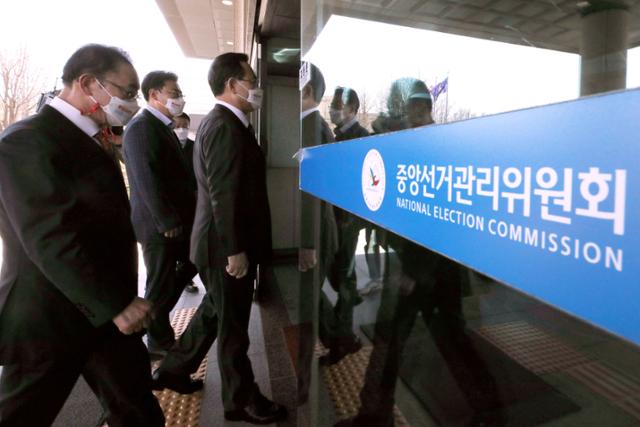
On the 5th, Ho-young Joo, representative of the People’s Power, is visiting the Gwacheon Central Election Commission for protest. National Company Reporters
The power of the people is protesting, saying that the Central Election Commission has made it impossible to use terms such as hypocrisy, incompetence, and narratives to resemble certain political parties. On the 5th, the people’s power visited the election committee in protest and criticized that “the election committee has been reduced to the ruling party election management committee.”
The NEC did not permit the banner’Why do you do the Seoul Mayor’s by-election?’ that women’s organizations had previously produced as a violation of the election law. There was a controversy over whether the NEC would restrict unfavorable phrases on passports. The NEC, however, said it was unfair, saying it also restricted expressions of close friends, such as “a liar candidate”.
In fact, the controversy over the words on the banner to encourage voting stems from the Public Official Election Act, which extremely restricts freedom of expression, rather than the interpretation of the election by the election committee. Articles 90 and 93 of the Public Official Election Act prohibit wreaths, banners, posters, prints, and photographs that affect elections other than those prescribed in the law. . This is to prevent election campaigns other than those enumerated in the law. The election banner alone allows candidates to post within twice the number of eups, myeons, and dongs in the constituency, but civic groups cannot post it. On the other hand, in the case of the voting encouragement banner, there is no number limit, but it cannot contain phrases that affect the election. Because of these strict regulations, wording continues to be contested on voting encouraging banners.
The NEC also said that Articles 90 and 93 of the Public Official Election Act restrict the freedom of expression, and issued an opinion to amend it in 2013 and abolish it altogether in 2016. However, it is none other than the National Assembly that has not properly changed this provision. This controversy can be seen as the self-profit of the National Assembly, which has left such a toxin clause alone.
However, the election committee should also look back on whether TBS (Traffic Broadcasting)’s’Let’s do things (1)’ campaign, which is reminiscent of the Democratic Party’s support, was not judged as an election campaign and thus caused a controversy about the bias of the passport itself.
News directly edited by the Hankook Ilbo can also be viewed on Naver.

